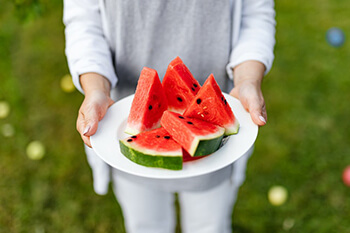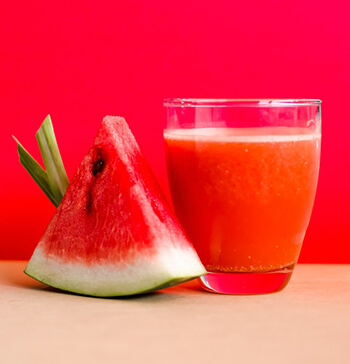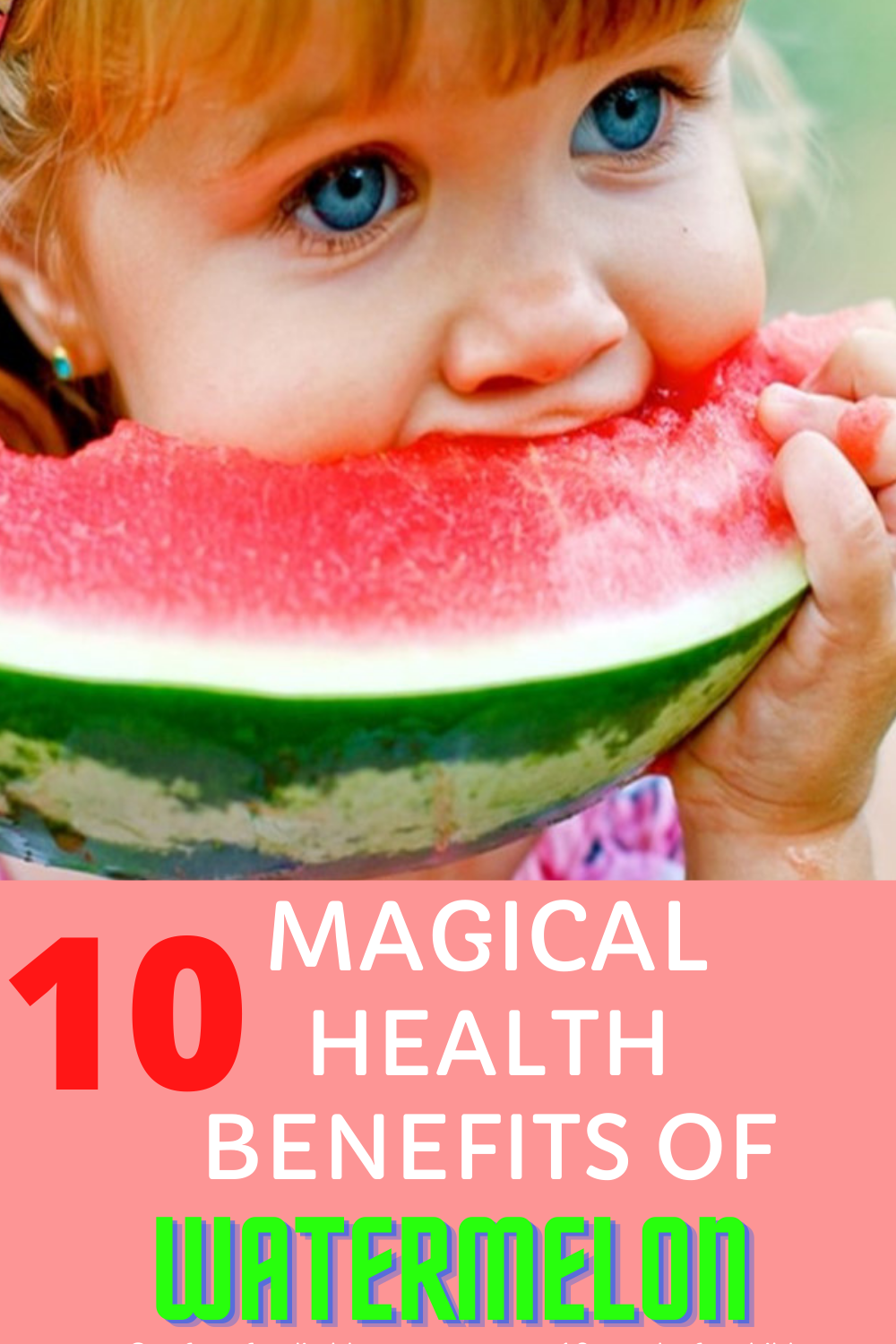Watermelon adds a distinctive flavor to any dish. The fruit is sweet and delicious, and watermelon juice is also very popular. Fresh, tasty, and bursting with a hint of summer, this is a popular, refreshing fruit.
It's also a great addition to a healthy diet. The health benefits of watermelon, whether the fruit itself or in juice form, are nothing to be sniffed at. Low in calories but high in vitamins, this is a fruit that definitely deserves a closer look.
Here are ten of the top health benefits of watermelon juice, or the fruit itself, for the human body.
1. Hydrating

Watermelon juice is hydrating, but interestingly, so is the fruit itself. Watermelon is known to be a sweet, juicy fruit, and it has a high water content.
While this shouldn't replace proper drinking habits, watermelon can be a great fruit to give you a boost of refreshing energy.
2. High in Nutrients

Most fruits and vegetables are rich in vitamins, minerals and nutrients that are essential for the health of the human body, and watermelons are no exception. A low-calorie, nutritious fruit, here are some of the vitamins and minerals you can expect to find in as little as one cup of watermelon:
- Potassium
- Magnesium
- Vitamin A
- Vitamin C
- Vitamin B1
- Vitamin B5
- Vitamin B6
- Amino acids
Watermelon juice contains the same vitamins. However, be careful when buying watermelon juice. Many fruit juices contain added sugar, which considerably raises the calorie count. Some fruit juices contain minimal fruit juice, preferring instead to simply replicate the flavor. This means you'll be getting high sugar levels and empty calories instead of real fruit juice.
3. Rich in Antioxidants
Antioxidants are crucial to a body's good health. Among other things, antioxidants help prevent cholesterol particles from hardening in your arteries, which can help to prevent heart strain.
Here are three key antioxidants that you can expect to find in watermelon:
Lycopene

This is a carotenoid, a plant compound found in many fruits and vegetables. Lycopene is linked to many health benefits, including boosting heart rate, reducing the risk of heart disease, and possible anti-cancer properties.
Interestingly, lycopene is what gives watermelon its red color. It can also be found in other red or pink foods, namely fruits and vegetables, like tomatoes.
While you can get lycopene as a supplement, it's better to get this antioxidant from your diet.
Cucurbitacin E
This antioxidant has impressive anti-inflammatory properties. Since inflammation is the root cause of many health problems, it's good to have anti-inflammatory-rich foods in your diet. Bitter melon contains even more cucurbitacin E.
Vitamin C
Vitamin C comes with a host of well-known health benefits, not least of all its protective properties. This vitamin helps to protect your cells from damage. Many fruits and vegetables contain healthy amounts of vitamin C, watermelon not least among them.
4. May Improve Heart Health & Reduce Blood Pressure

We've already briefly mentioned the benefits that antioxidants have in helping protect the arteries from a buildup of cholesterol, but fresh watermelon has even more benefits for good heart health.
Lycopene, an antioxidant contained in watermelon, may help to lower blood pressure and cholesterol. Watermelon also contains citrulline. This is an amino acid that increases levels of nitric oxide in the bloodstream. Nitrix oxide works towards expanding your blood vessels and improving blood flow. This, in turn, helps to lower blood pressure.
All of these factors help to relieve strain on the heart, lowering your risk of heart disease. Of course, eating watermelon or drinking watermelon juice isn't some kind of magic medicine. This needs to be a part of a balanced diet and healthy lifestyle.
5. Anti-Inflammatory Properties

Another great benefit of eating fresh watermelon or glugging a cup of watermelon juice is its anti-inflammatory properties. Since many diseases have inflammation as their root cause, adding watermelon to your diet is highly recommended.
Both lycopene and vitamin C contain high anti-inflammatory levels, and they are both found in watermelon. Interestingly, lycopene might also work to benefit brain health, making it a handy tool in the struggle against degenerative diseases such as Alzheimer's.

6. May Have Anti-Cancer Properties
Some fruits, watermelon included, have been linked to anti-cancer compounds. While further studies are needed, this could mean that compounds contained in these fruits have the ability to stop cancer cells reproducing, and possibly even killing these cells.
Cucurbitacin E, for example, may have the ability to inhibit tumor growth. Lycopene has also been associated with a lower of risk of cancer, particularly cancers of the digestive system.
Of course, more studies are needed. However, in the meantime, adding fruits like watermelon to your diet would a wise choice. These fruits are packed with nutrients and vitamins, and can only help to make your body more healthy.
7. Good for Eye Health

Inflammation can also have an impact on our eye health. This is a key cause of macular degeneration. Unfortunately, macular degeneration is all too common, and can lead to blindness in later life.
8. Relieves Muscle Soreness

Watermelon contains l citrulline. This is an animo acid which may help to relieve muscle soreness. This makes watermelon a popular post-workout snack or drink. Interestingly, eating watermelon or drinking its juice is related to an enhanced absorption of I citrulline more than simply taking citrulline by itself.
So, watermelon juice might be the best thing to quench your thirst after a workout, as it will also help ease your sore muscles! While studies are still ongoing into the effect of l citrulline on exercise performance and stamina, it's definitely worth adding watermelon (fruit or juice) to your workout routine.
9. Aids Digestion
Watermelon contains less fiber than some other fruits (dates and figs, for example, are known to be high in this type of carb). However, even this small amount of fiber can aid digestion and boost your gut health.
Also, watermelon contains plenty of water, which is essential to a smooth digestive process. The water smoothes the passage through your digestive tract, hydrating you at the same time, and fiber adds bulk and texture to stools. Many fruits and vegetables contain decent amounts of fiber or water, but watermelon handily has both of these.
Watermelon is a nutritious snack that will leave you feeling fuller for longer. Junk food often provides empty calories with no nutritional value, leaving us hungry soon afterwards. Snacking on watermelon is likely to provide you with the energy you need, while leaving you full and satisfied.
10. Healthy Skin and Hair

Last but not least, watermelon can help to give you healthy-looking skin and hair. This is mostly due to two of its vitamins, C and A.
Vitamin A is responsible for creating new skin cells. If you don't have enough vitamin A, your skin may become dry and flaky. Watermelon contains vitamin A, giving your skin a boost.
Vitamin C is a well-known nutrition must-have and health supplement. It produces collagen, which gives skin a smooth, supple look, and keeps hair strong.
Watermelon may also help to protect our skin from sunburn. This is handy, since watermelon is generally considered a summer fruit, perfect to eat or drink on the beach or in the sun!
What to Watch Out For
Watermelon is a delicious and healthy snack - in moderation. Here are a few things you should consider before you start eating (or drinking) watermelon every day.
High in Sugar

Watermelon is a delicious fruit. However, it also contains a lot of natural sugars. Diabetics or people with heart disease who are watching their nutrition and sugar intake should be careful how much watermelon they eat or drink. Fruit juices in particular may contain added sugars.
Watermelon is generally not recommended for diabetics or those managing their blood glucose levels due to its high sugar content.
Eat in Moderation

Too much watermelon can have a nasty effect on our digestive system. The high levels of lycopene and potassium can be related to unhealthy conditions if we take in too much.
These nutrients are essential to the healthy running the body, but remember that our bodies are a delicate ecosystem. Too much of anything is not going to be good. It can lead to cramping, gas, bloating, diarrhoea, and more.
However, this is an easy fix. Simply keep an eye on your portions. You can eat up to 3 cups of watermelon a day with no side effects. We're all individuals, and if you find that you can eat less than that, listen to your body.
Possible Allergic Reactions
Just about every food we can eat carries the risk of an allergic reaction. If you've had reactions to watermelon or a related melon fruit in the past, or someone in your family has an allergy to watermelon, consult your doctor first.
If not, you're unlikely to experience any adverse effects. Just in case, here's a few symptoms to keep an eye out for:
- Hives, or an itchy, tingling rash
- Tingling in the tongue, lips, and throat
- Stomach pains and cramps
- Vomiting
- Diarrhea, or loose stools
It's worth noting that allergic reactions to watermelon are rare. Unless you have a history of allergies, chances are, you'll be fine. Consult a doctor for medical advice, diagnosis or treatment if you have any reason to be concerned.
Should I Eat Watermelon?
Whether you like a glass of watermelon juice post-workout, or you enjoy a cool slice of watermelon while sitting in the garden, this fruit is a nutritious and delicious addition to anyone's diet.
Watermelon has a hydrating effect thanks to its high water content. It also provides plenty of energy.
This is also a useful snack to have on hand if you're on a weight-loss mission. While too much watermelon isn't good for the body, in moderation, it can be a nutritious weight-loss snack. Aside from the vitamins and minerals found in watermelon, it can also help to deal with sweet cravings.
Sugar is addictive, and dealing with sugar cravings can be one of the hardest parts of trying to lose weight. Watermelon can provide the sugary kick we need, packaged as a healthy, hydrating fruit.
Watermelon is definitely something you should add to your diet, whether in juice form or as the fruit itself. Watermelon fruit may not be available all year round where you live, but the juice should be available. Enjoy!

